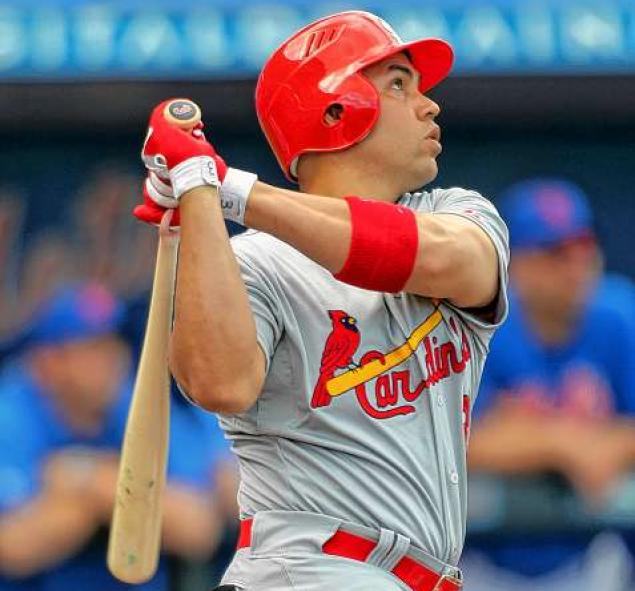
Whenever a player’s performance can be said to match Babe Ruth’s, it puts him in the upper echelons of the baseball world. Have that performance in the pressure-packed postseason, when even some of the greatest failed to deliver, and it puts him even higher. Such is the case with the St. Louis Cardinals’ Carlos Beltran, who this year has surpassed Ruth in career postseason home runs, doubles, RBIs and total bases, making him the most productive hitter in playoff history. But will being the most prolific hitter in the playoffs be enough to get him into Cooperstown alongside Ruth?
What makes Beltran’s case for the Hall so interesting, and debatable, is he’s neither an obvious “yes” nor an obvious “no.” He hasn’t reached either of the two major milestones that tend to make position players locks for the Hall (500 home runs, 3,000 hits) and likely won’t. Despite having more postseason home runs than Ruth, he has a little more than half as many in the regular season — 358 at the end of the 2013 season. That’s a good total, but it’s hardly enough to make him a lock, considering the era he’s playing in. Among active players, he’s ranked 13th. And among all players, he ranks 81st behind non-Hall of Famers Joe Carter and Dale Murphy.
It takes more than having a lot of HRs to be a great hitter. But, unfortunately for Beltran, his other numbers aren’t outstanding. His 2,228 career hits put him at 170th all-time. His .495 slugging percentage and .358 OBP make him 119th and 480th, respectively. And at .283, his batting average is decent, but hardly exceptional.
Also detracting from his case is that Beltran has never led the league in any of the traditional major stats. He’s made some appearances in the top 10 throughout his career, but he’s hardly been a mainstay. As far as awards go, he does have two Silver Sluggers and a rookie of the year, but no MVPs. The highest Beltran has finished in MVP voting is fourth, with zero first-place votes. That was in 2006, his best season at the plate.
How a player does at the plate determines only half of his overall performance (unless that player is a DH, in which case it’s everything, save for a few interleague games). And with Beltran, that other half is a very, very productive one.
Yes, Gold Gloves are often more indicative of how popular a player is, but in addition to winning three consecutive Gold Gloves, Beltran has two Fielding Bible Awards. (The Fielding Bible Award is given to the best fielder at each position, but, unlike a Gold Glove, is determined using advanced sabermetrics and expert opinion). He would’ve had three, but he lost out on one of those to a still-in-shape Andruw Jones. Statistically, Beltran has been a top-notch fielder. He led the league in assists as a center fielder in 1999, 2001, 2002 and 2006, and was in the top five three other times. His 108 assists from center are first overall among active players (and six more than Andruw Jones has). His high marks in other defensive stats, including range factor, total zone runs, putouts and double plays, point to him being among the best defensive center fielders of his era.
And that’s the key to Beltran’s candidacy. Not the fact he’s been great with the glove. Not the fact he ranks 83rd all-time in WAR (sixth active). Not the fact he’s only one of six players to hit 300 homers, have 2,000 hits and steal 300 bases. Not even the fact he’s been Babe-like in the postseason. The key to his candidacy is not many center fielders have played as well as consistently as Beltran has.
Sure, the all-time greats — such as Willie Mays, Ty Cobb, and Tris Speaker — were much better players. But throughout the 2000s, Ken Griffey Jr. was in the twilight of his career, Andruw Jones dropped off the planet after 2006, and Jim Edmonds, although more powerful, was nowhere near Beltran in terms of speed. Even compared to center fielders from other eras, Beltran’s numbers hold up. He’s better offensively than Richie Ashburn. He has virtually the same OBP and a higher slugging percentage than Kirby Puckett. And he has a higher OBP, slugging percentage and WAR than fellow 300-300-2,000 man Andre Dawson, who played more games at right field than center. If Beltran remains healthy and continues his pace for a few more years, he’ll be even further ahead of those guys.
Beltran’s cumulative offensive and defensive numbers put him among the top-10 center fielders of all time. Considering how many hundreds of men have played the position in the 100-plus years of major-league play, that should be enough to get him in. But just in case that’s not convincing enough, let’s consider Beltran’s performance in the context of the 40 seasons since Willie Mays retired. In the course of those four decades, no one, other than Ken Griffey Jr., has put up better numbers and been as good of a defender as Carlos Beltran. And if he ever captures a World Series ring, it’s going to be difficult to leave him off the ballot .
